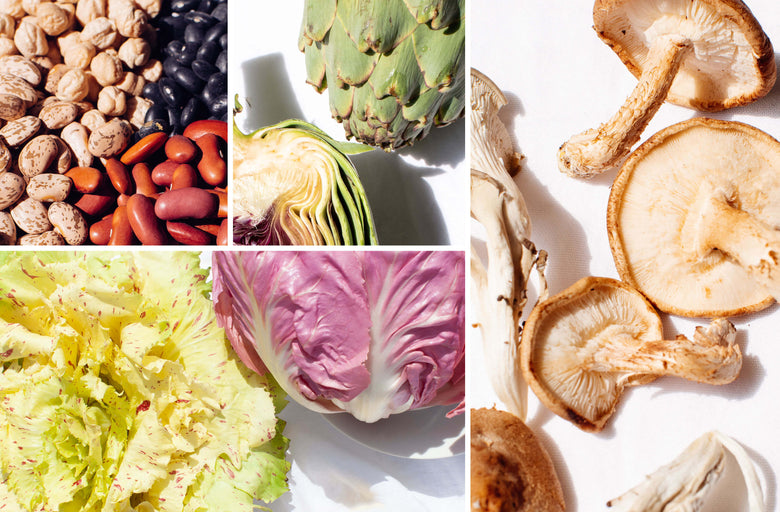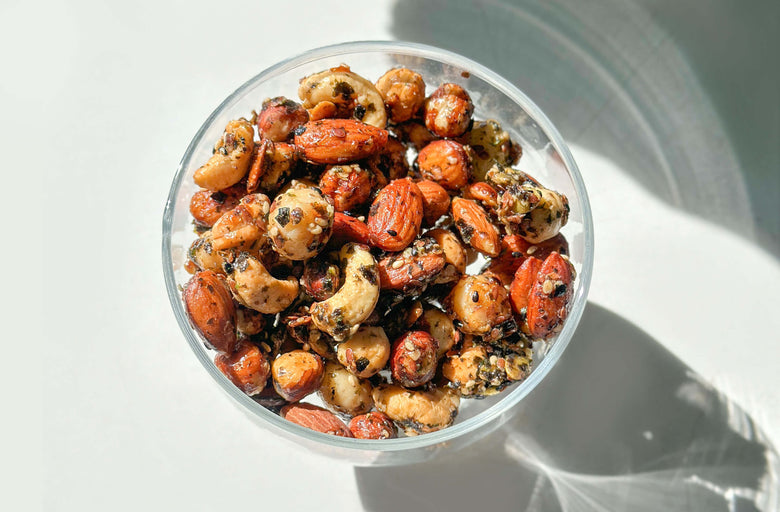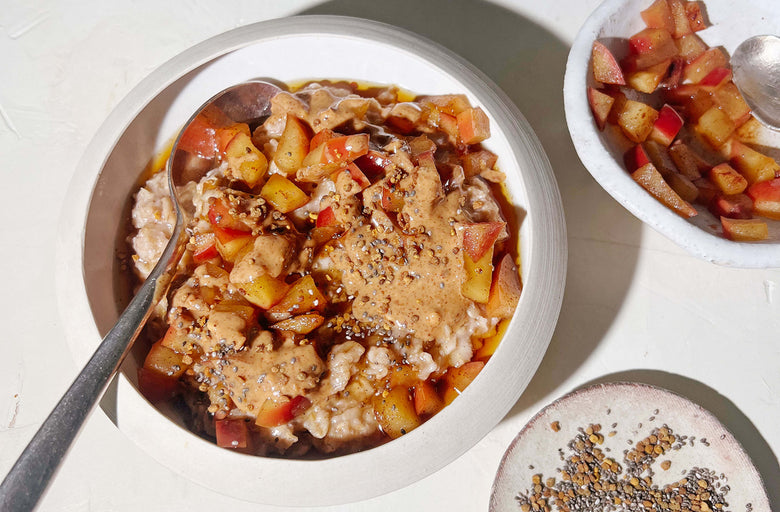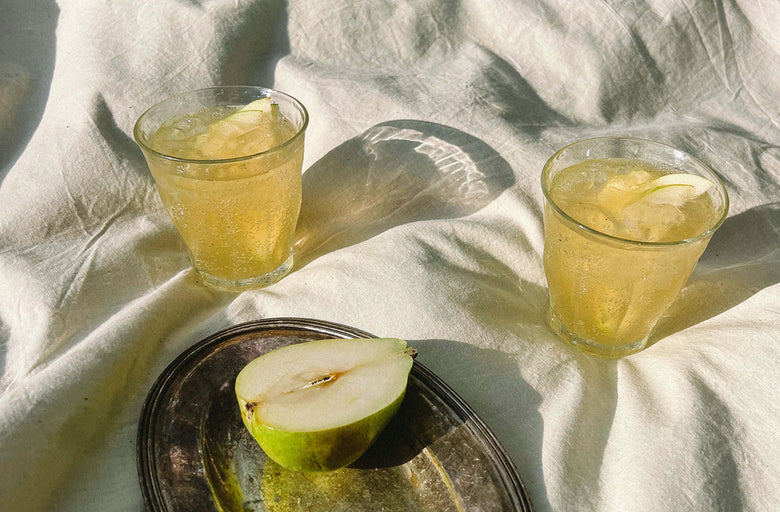How are you tapping into your pleasures this year? It may mean something different depending on the chapter of your life, the time of month, the weather forecast— but we wholeheartedly believe that you deserve to feel alive and harness your true powers no matter what. We spoke with Jillian Lynch, midwife, doula, and radical women's health care provider, whose mission is to bring sex and pleasure back in the conversation (and bedrooms) of women who are partnered, pregnant, postpartum, single, or somewhere in between. We talked about re-discovering your sexual power, the peaks and valleys of desire during pregnancy and beyond, and healing the world one orgasm at a time.
Can you share your background and journey to becoming a midwife?
I have been intrigued and inspired by the power, mystery and beauty of pregnancy and birth since I was a small girl. As a young child I was certain I would grow up to become an OB/GYN. As a teenager I spent a year living abroad in the Netherlands and lived with a family who had had three home births with midwives. Upon discovering that fact, I became curious about the presence and role of midwives in my own country and began researching training pathways to becoming a midwife in the United States. While finishing my undergraduate degree with a focus on women’s health and spirituality, I completed a doula training and began volunteering as a doula at San Francisco General Hospital. Shortly after completing my undergraduate degree I enrolled in the National College of Midwifery and secured an apprenticeship at the Northern New Mexico Birth Center. It was there I began learning the art and science of providing full spectrum Midwifery care. Over the last 14 years I have attended roughly 350 births and for the last 10 years have been a licensed midwife and have caught nearly 250 babies in my homebirth practice. This year, after 14 years of birth attendance and baby catching, I decided to close my homebirth practice in order to focus on creating a simple and sustainable women’s health practice. It is my desire to be able to support and guide women and specifically, mothers, in finding their way back to the root of themselves, claiming their fire and their desire through the action of devotion to self-care and self-love.
Pregnancy is one of the biggest transformations of life ― you change physically, mentally, emotionally, a million more ways― what were your biggest revelations from becoming a mother?
I’m sure I could write a couple of books in response to this question! I’d have to say that becoming a mother is a huge rite of passage: beautiful, raw, and fraught with profound lessons in learning to let go. Motherhood is rarely what we expect it to be and certainly nothing like the picturesque reality that social media and Hollywood have painted for us. Many of us may strive to be the perfect mother and to do everything right. We read every article, research, study and make each decision as if it is the most important decision we’ll ever make. We listen to and consider every bit of research and advice, clinging to the notion that if we do everything perfect, do everything right, not only will our children turn out okay, we may even just raise tiny super humans. I’d say my biggest motherhood revelation came a couple of years after the birth of my second child when I finally realized I wasn’t raising super humans, but rather, I was raising humans, imperfect, flawed, beautiful, messy humans. And you know what? That’s okay. Perhaps even more important, was the simultaneous revelation that I was not a super mom, and that I could no longer hold myself to the unrealistic expectations of Western parenting pressures. Around this same time I began realizing the importance of finding time for myself amongst the demands and chaos of mothering. At that time I was so deep in my role as caretaker, I had all but forgotten my own self, my own needs, and my own desires. Slowly, I began reclaiming bits of myself, rediscovering myself and taking my own needs as seriously as my children’s. So I suppose my biggest revelation in motherhood has been remembering not to lose myself in the face of it.
So I suppose my biggest revelation in motherhood has been remembering not to lose myself in the face of it.
In the transformation of becoming a mother, how does someone’s sexual energy change and adapt?
As women we all adapt to our changing bodies, lives, and circumstances so differently. For some women, pregnancy may bring a huge increase in libido and orgasmic potential while postpartum may follow with a giant plummet in sexual desire and libido. For others it’s the opposite. For some, pregnancy and postpartum may entirely squash sexual desire and for others it is heightened and increased in both. The only thing I can say for sure is that it is likely to change in some way or another. I appreciate the reference in the question to the word adapt. I think it’s the perfect word. Addressing and meeting changes in our sexuality brought forth by pregnancy, postpartum and motherhood requires that we hone our adaptation skills. In fact I would say that motherhood is one giant lesson in the art of adaptation!
How can someone rediscover desire during pregnancy?
Again, I’d have to say that for some women sexual desire during pregnancy is at an all time high. For others it may be extremely low. It can also be different from pregnancy to pregnancy. I experienced really different sexual response during each of my own three pregnancies, ranging from hardly any libido at all, to extreme libido! I think the key to addressing our sexual needs during pregnancy is flexibility and adaptation. Some women may struggle with the physical changes of pregnancy, feeling debilitated in early pregnancy by extreme fatigue and/or nausea and in late pregnancy, by the physical pain and discomforts that arise. Some women, especially first-time mothers, but really many women, struggle with feeling less attractive when they start putting on the weight that comes with pregnancy. Body image struggle can certainly lead to a decrease in sexual interest, particularly if the principal fear is a feeling of being less attractive or desirable to one’s partner. For pregnant women struggling with self image and desire, I tend to encourage taking up or increasing their masturbation practices. I like to remind them of the many benefits of orgasm and encourage them to make it a self-care/self-love practice. I encourage visualizations and fantasy as a way to bring more fire and desire to the pelvic floor and more blood flow to the vulva. Sometimes the simple act of prioritizing sexual fire and orgasm can ignite a little fire and get things flowing again.
How do we communicate to our partners during this time?
Keeping avenues of communication open with our partners is absolutely key to the health of our relationships as we navigate sexual ebbs and flows during pregnancy, postpartum, and motherhood. I would say the two most important components of healthy interaction with our partners during these huge transitions are transparency and playfulness. Being able to honestly communicate the barriers we may be facing in relating sexually with our partners may help contextualize the changes they are also experiencing. Maintaining a playful attitude even when we’re not necessarily up for sex can be a way of meeting our partner’s needs for connection. For example: rather than turning down our partners advances because we are tired, or uncomfortable, or nauseous, we can consider saying: Thanks so much for finding me sexy, for seeing me that way, even when I’m not feeling it. How about I hold this oil for you, or be here to hand you a toy? Maybe I can watch you get yourself off? If partner sex isn’t appealing but we’re really enjoying masturbation, we can consider inviting our partners to watch. I think what’s most important is maintaining honest communication, playfulness, and flexibility.
the two most important components of healthy interaction with our partners during these huge transitions are transparency and playfulness.
What about after baby?
Everyone’s experience is going to be different, but, by far the most common thing I see is a substantial drop in female libido during the first year or two postpartum. This varies widely depending on age, length of time breastfeeding, whether there has been birth or pelvic floor trauma, how many children the mother has, how supportive and helpful her partner is, etc... It’s also going to depend greatly on how much postpartum support she has, how often and how much self-care she’s getting in. At the very least we can generally expect at least six months of significantly reduced libido. For many women I would say this extends closer to a couple of years. I think again, that communication and playfulness are key! Also, it’s so important to have patience and compassion for our partners during this time. The sexual relationship really does change substantially with the addition of each baby, and very often our sexual relationships really do take the back seat. I think it’s of great importance to honor the experience of loss that our partners may feel, equally with the honoring of our own kind of ‘loss of self’ that often comes in the initial wake of motherhood.
How do you get into the mental place to find your desire? What is the biggest piece of the puzzle?
Self care. Self care. Self care. Oh, and self love. Did I mention self care? Okay. But honestly this one is huge. So often, in motherhood, we really do lose sight of ourselves. We get so caught up in doing the work of mothering, wearing the masks, and playing the various roles: mother, partner, wife, provider, nurturer, home manager, stay at home mom, work at home mom, working mom, etc... and so on. In order to connect with our desire and our sexual fire, we must remember who we are and what we want. We have to connect with and remember our own wants and needs. The biggest and most important work I’ve done on my motherhood journey has been the reclaiming of myself. Stoking my fire and finding my desire again really only came once I made a commitment to my self care practice. For me this has meant maintaining a regular yoga practice, walking, time in nature and a commitment to eating clean, healthy foods that keep me feeling good. Taking time away from home and the responsibilities of motherhood helps me to keep in touch with my own identity outside of motherhood. It gives me the space to have impassioned thoughts, playful fantasy, and desires in and outside the realms of sexuality.
Self-care. Self-care. Self-care. Oh, and self love. Did I mention self-care?
Can you talk about this idea of setting “orgasmic intentions”?
I believe that we are always setting intentions in our every thought and action. The internal landscape of our mind is rich with intention setting. Every belief we feed, every thought we nurture creates the very fabric of our reality. Most of us are completely unconscious of this incredible power and our ability to harness it. My yoga and mindfulness practices have radically transformed my own thoughts and beliefs over these last five years since I made a commitment to healing myself. I have been using breath and movement as my principal tools in releasing long held negative patterns, beliefs, and trauma. During orgasm/s we release incredible amounts of energy, stress and tension from our bodies. Reaching orgasmic and multi-orgasmic states requires a significant amount of surrender. When we are vulnerable and receptive we can reach extreme states of ecstasy and can act as a channel for universal energy to flow through and around us. As someone who believes deeply in the power of thought and intention setting, it makes absolute sense to me that we ought to use the powerful energy of orgasm as a catalyst for change in our lives and in the world. Why not start changing the picture of our internal landscape and the world, one orgasm at a time?
How does having orgasms lean the world into the feminine, and help to heal the world? What’s the bigger picture of pleasure?
This is such an important question! For us women our pelvic floors are the seat of our power, our root, our place of fire and when ignited can activate and drive us towards our greater purpose. Our sexuality when harnessed for its transformational potential can change the world. As women, life creators, and sustainers, holding the future generations in our wombs and hearts, we cannot allow our fires to burn out. We must stoke our fires and harness our greatest power for the sake of our children and our world. In my own experience I have found that the more connected I am to my pelvic floor, the more I actively give energy to charging up my vulva and my womb through visualization, meditation, masturbation, and sex with my husband, the more powerfully I feel myself in the world. When I am feeling deeply connected to my root, I feel more fire, passion, and clarity in all aspects of my life. The more charged up I am, the more productive, joyful, and intentional I am in my every action. Having three young children means I have to be very intentional about carving out the time to focus on my own passion and pleasure and it’s not always easy. Things certainly do still ebb and flow. BUT, I can always feel the benefit of making time and space to recharge my self sexually.
If we’re single, what are some things we can be doing to connect with this powerful feminine energy?
I really think this answer is for everybody, single and partnered women alike! When I haven’t noticed desire surfacing for a while I will sometimes close my eyes and focus on my vulva, feeling her, visualizing the blood flowing to her. I may recall a particularly joyful, juicy orgasmic or sexual encounter. This almost always wakes me up to desire again! So often, it isn’t that our fires have burnt out but rather that we’ve forgotten, or perhaps never really learned how to stoke them. In our culture there is so much focus on partners as the conduit for pleasure. So, when we don’t have a partner or we’re not feeling connected with the partner we have, many of us give up on pleasure. Perhaps we resent our circumstances or our partners for not delivering pleasure to us. The truth is this: we’ve got to be willing to turn ourselves on! Many of us have never learned the art of self pleasure. I cannot express more seriously how important this is. I have a husband, and we have been through a lot together, including three children, financial stress, near divorce, etc... During those times I felt HE wasn’t meeting my needs. Now I understand that it was ME that wasn’t meeting my needs. During periods when we struggle to connect sexually and even when we are connecting, I like to carve out ample time for self pleasure and masturbation. This actually drives my desire and makes me want to connect more in all aspects of my life, including with my husband.
How has yoga helped you with discovering your sexual energy?
This is a beautiful and complicated question. For me, I have found the practice of yoga to be a profoundly important tool in healing my own childhood sexual trauma. Healing from this trauma has allowed me to reclaim my life, my power and clarify my purpose. It has allowed me to open again to joy, to move more mindfully towards full embodied living, showing up more wholly for my family and my marriage. In my experience the steady release of trauma and the slow rebirth of my sexual fire have most certainly been directly proportional to one another. As humans, we are innately sensitive and intuitive, we are emotional beings programmed for deep connection. Sadly, most of us have been raised by families and brought up in cultures that fail to meet our most basic needs: community, connection, safety, vulnerability, unconditional love, and the space to blossom into our most wildly authentic selves. In the absence of these beautiful ideals, many of us have experienced varying degrees of abuse and almost all of us carry at least some degree of trauma around in the soft tissues of our bodies. Unaddressed or stagnant trauma remains in the body and can be the most insidious and damaging force in our lives, holding us back, making us sick, paralyzing us in fear, keeping us in a sort of suspended animation, unable to heal, grow, flourish or move forward in our lives. It impacts every choice, action or inaction we make in our daily lives. Our trauma is often the voice of fear, sadness, or anger that becomes the fabric of our existence. BUT, here’s the most beautiful thing about trauma: when we examine it, address it, give it permission to move, it can transform into some beautiful things! Once our trauma begins moving fluidly out of our bodies, we can make space for joy, for light, for beauty, for love, for fire, for power, for truly wild unhindered living.
How is honoring our desire and sexual fire a form of self-love?
Honoring and making space for desire and sexual fire is the true embodiment of self love. Honoring and tending to our sexual fires is one of the best ways to allow joy, pleasure, and purpose to spill over into every aspect of our lives.
What does pleasure mean for you? What are your favorite ways to seek it out?
This question actually reminds me of a saying in Dutch that I remember loving so much during my time living there; Veel Plezier. Directly it translates to "feel pleasure", but it actually means enjoy yourself or have fun and is said regularly when you depart from a friend or loved one and are headed to do something enjoyable. In the U.S when we hear the word pleasure, most of us associate it with sexual pleasure. While, that is most certainly one form of pleasure, there are truly so many others. Pleasure for me means being in true presence with nature and/or another human being. I experience profound sensory pleasure in the moments when my mind is completely quiet and I can see the world around me with complete and utter objectivity. Beholding for a moment what it is to simply be, in the world and in the presence of others. Perhaps sexual pleasure comes to mind when we hear the word pleasure because, for many of us, the orgasmic state may be the only time we experience this true presence and true pleasure. I tend to do my best to call forth this feeling, this sensation, this true embodiment, whenever possible, finding incredible pleasure in even the littlest things.
More on Pleasure, Womanhood, and Self-Care:
The Many Benefits of the Big O






